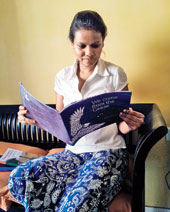 |
| Ruby Hembrom of Adivaani with a copy of We Come from the Geese. Picture by Sushovan Sircar |
“In the beginning there was no land. Everything was under water
Thakur Jiv, the Supreme Being was present. As were the Bongas
The Bongas asked for Thakur Jiv’s blessing to create human beings
If it so be desired, we will create them”
— We Come from the Geese, an illustrated children’s book published by Adivaani
The Santhals were born through a stroke of godly ingenuity, says the book of creation of India’s first inhabitants.
To create Adivaani, a publishing house launched by a group of three amateurs to lend a voice to the nation’s indigenous population, months of human planning and perseverance were required.
Ruby Hembrom, a 35-year-old IT professional “with a big idea and little money”, started Adivaani in July last year with two friends — Mexican journalist Luis Gomez and Joy Tudu, a Jharkhand-based tribal rights activist.
“It’s a time machine for the Adivasis,” she said. “Our history and stories have been passed down generations orally. Since these tales are steadily vanishing, documentation is the key to their survival. Adivaani is primarily an attempt to let people know that we are capable of writing, too.”
“We at Adivaani want to go back in time to rescue what was left behind and leave something tangible for the future…. The countdown has begun,” their website says.
Daughter of a Bishop’s College theology professor, Calcutta-born Ruby studied at La Martiniere for Girls and took a degree in law from Calcutta University.
She has been with the IT industry in Gurgaon and Calcutta for the past 10 years, happily earning a good pay until she was overcome by the urge to do something meaningful for her largely invisible community.
The first step was to join a publishing course in April 2012. She soon realised that the tribal voice was missing from the popular discourse. The disappointment spawned the idea of setting up a publishing house: “One that is by the Adivasis and not by an urban historian writing from a pedestal.”
She found two amazing partners in her endeavour. Gomez was Ruby’s batchmate at the publishing course along with Tudu. He had two decades of experience in writing on the indigenous people in Latin America.
Their first book was out in October last year. It’s a translation of her father’s doctoral dissertation, Santal: Sirjon Binti Ar Bhed-Bhangao.
This one along with Santhal writer and blogger Gladson Dungdung’s Whose Country is it Anyway and We Come from the Geese were released at the New Delhi World Book Fair in February.
“Allowing the tribal people to write for themselves certainly gives the story a greater sense of autonomy,” said Tudu, who distributes Adivaani’s books across Ranchi and Dumka.
“The books were reasonably priced and attractively designed. Our inbox was flooded with mail soon after their release,” said Gomez, who looks after Adivaani’s technical side.
Calcutta, however, was cold in the beginning. “We expected a similar reception in Calcutta but no distributor or bookstore was forthcoming,” Ruby rued.
Finally, after several failed attempts across the city, she found Earthcare Books on Middleton Street. “I was surprised by the reception. They gladly accepted my books,” Ruby said. “I had just three copies of each book in my bag.” Barely 30 minutes after she stepped out of the store, the manager called: “Send as many copies of We Come from the Geese as possible.”
Store manager Sumit Sarkar said: “We support books on development and alternative subjects. Adivaani seemed interesting.”
There has been a steady demand from the Calcutta bookstore and two others in Ranchi. Ruby and her friends have nearly completed work on the second instalment of the illustrated book.
Boski Jain, another friend from the publishing course, chipped in with the illustrations. “Several schools in Ranchi have picked up our books for their libraries. Some stores in New Delhi are displaying them, too,” Tudu said.
For the time being the start-up venture is running on loads of goodwill and generosity, including Ruby’s salary from her IT job. Registering the publishing house and printing a thousand copies of the three books at a press on Amherst Street cost about Rs 1.5 lakh. The world wide web is doing its bit. “We planned to raise $5,000 (about Rs 2.75 lakh), but managed only $120 (about Rs 6,585) in two months. It’s okay for a start,” Gomez said.
They have some expansion plans. “We will gradually venture into writings by other communities such as the Kodas, the Mundas and the Oraons,” Ruby said.










